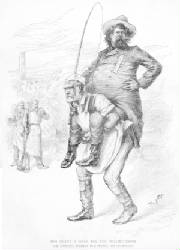|

Marxist View
Ay, workman, make me a dream,
A dream for my love.
Cunningly weave sunlight,
Breezes, and flowers.
Let it be of the cloth of meadows.
And--good workman--
And let there be a man walking thereon.
Maria's Marxist View:
I picked this poem because I felt that the biggest thing that stood out to me was that he uses the
word workman. The feel of the poem makes it seem as if the person speaking is used to ordering others around. The
fact that he calls the other person a workman makes it seem as if he himself is not used to working hard. It sounds as if
he is speaking to a servant. The marxist view of thinking is emphasizing the difference between social classes,
the haves and have-nots.
Feminist View
There
was a man and a woman
I
There was
a man and a woman
Who sinned.
Then did the man heap the punishment
All upon the head of her,
And went away gaily.
II
There
was a man and a woman
Who sinned.
And the man stood with her.
As upon her head, so upon his,
Fell blow and blow,
And
all people screaming, "Fool!"
He was a brave heart.
III
He was a brave heart.
Would you speak with him,
friend?
Well, he is dead,
And there went your opportunity.
Let it be your grief
That he is dead
And your opportunity
gone;
For, in that, you were a coward.
Robin's Feminist View:
I picked this poem for the men and women's roles involved. The Feminist theory considers how
the portrayal of female characteristics reinforces or undermines sexual stereotypes. More or less, this theory looks
deeply into the relationship between men and women in society, and acknowledges that these relationships have been unequal
in the past. There are three stanzas to this poem, and I think it opens the door for some feminist critizism.
From the first stanza, I get the idea that the man has a lot of power and authority over the woman. It's almost like
he's happy in that role. One could take the stand that he is hitting her, hence the words "punishment" and "blow" upon
her head. In the second stanza, it's almost gutsy that he is described as being "brave" standing up to his woman.
Just because he is physically stronger than her doesn't mean that he has to abuse that power. I'm not quite sure what
to make of the last stanza, but I take that either the woman killed him, or he died in some other way. I get a sense
of regret from the last stanza, that he either wishes he wouldn't have treated her that way, or he didn't understand how strong
the woman could be, despite his preconceived notions. Feminism should be seen as a concept of the past, through how
much our society has changed, but things from this poem still do happen today, unfortunately. The point is that women
are equal to men, and shouldn't fall to be the easy victim. If he can hit her, then she should be able to hit him back
(regardless of the terrible relationship between them).
Cultural View
A Spirit Sped
A spirit sped
Through spaces of night;
And as he sped,
he called,
"God! God!"
He went through valleys
Of black death-slime,
Ever calling,
"God! God!"
Their
echoes
From crevice and cavern
Mocked him:
"God! God! God!"
Fleetly into the plains of space
He went,
ever calling,
"God! God!"
Eventually, then, he screamed,
Mad in denial,
"Ah, there is no God!"
A swift
hand,
A sword from the sky,
Smote him,
And he was dead.
Jim's Cultural View
I believe that this poem is about how we as a culture use prayer nowadays unlike how it used
to be back then. Back then, prayer was used because they actually believed in it and thought that without a doubt that it
works and their prayers would be answered. Nowadays, people are so satisfied with instant results that when they pray and
nothing come of it, they might pray again. After that if still nothing they might stop praying or even worse they might even
curse it a little. Then the worst case scenario would probably happen. What I believe is that if you believe or even
if you don't do all you can do all the way when something bad happens so if the outcome turns out to be unfortunate, atleast
you feel lke you've done all you can and there was no other outcome.
|

